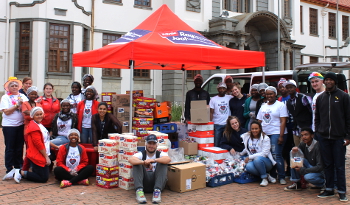Latest News Archive
Please select Category, Year, and then Month to display items
04 April 2024
|
Story Lunga Luthuli
|
Photo SUPPLIED
 Dr Juliet Kamwendo champions gender-inclusive climate action in Africa. Her expertise at the recently held AFR100 workshop highlighted vital steps towards sustainable and equitable development.
Dr Juliet Kamwendo champions gender-inclusive climate action in Africa. Her expertise at the recently held AFR100 workshop highlighted vital steps towards sustainable and equitable development.
Dr Juliet Kamwendo, Lecturer and Programme Director for Gender Studies in the Centre for Gender and Africa Studies at the University of the Free State, is spearheading efforts to integrate gender considerations into Africa's climate restoration agenda. Reflecting on her involvement, Dr Kamwendo stated, "This is particularly crucial, as women make up almost 50% of the population in Africa, and the depletion and degradation of land affect them disproportionately."
She recently served as a gender expert at the AUDA-NEPAD AFR100 workshop in Ouagadougou, Burkina Faso, from 25 to 29 March 2024. This initiative aims to restore forests and degraded land across Africa by 2030, with a focus on gender equality.
The workshop emphasised the integration of gender perspectives into the AFR100 project, acknowledging the disproportionate impact of land degradation on women. Dr Kamwendo's expertise highlighted the need to empower women in climate change interventions, addressing existing gender inequalities exacerbated by environmental degradation.
“Women – who are primarily responsible for household food security and water provision – bear the brunt of environmental degradation, leading to increased workloads, reduced income opportunities, and heightened vulnerability to climate-related disasters. Furthermore, the loss of forest cover and biodiversity further exacerbates the challenges faced by women, particularly in rural areas where they depend heavily on natural resources for their livelihoods,” added Dr Kamwendo.
Her participation highlights academia's crucial role in fostering inclusive and sustainable development, emphasising interdisciplinary collaboration to tackle complex environmental challenges. Through initiatives such as AFR100, stakeholders are working towards a more resilient and gender-responsive future for Africa.
A Kovsie friend in need is a Kovsie friend indeed
2015-09-23

Several student organisations have recently started
initiatives to lessen the burden on needy students,
and on the broader community. It is because of
these initiatives that donations of food, commodities
and clothes reached the No Student Hungry (NSH)
Bursary Programme at the University of the Free State.
Photo: René-Jean van der Berg |
Kovsie students have often showed that a friend in need is a friend indeed. Several student organisations have recently started initiatives to lessen the burden on needy students, and on the broader community.
It is because of these initiatives that donations of food, commodities and clothes reached the No Student Hungry (NSH) Bursary Programme at the University of the Free State.
The Rag Community Service and NSH offices are extremely grateful to students and staff for their selfless donations, also in respect of the difference these initiatives are making to Kovsies’ chances of having a better future.
The food and commodities will be distributed to the community, while the clothing donations are used for regular clothing sales in order to raise funds.
The food donations included a substantial donation from the support organisation, Gift of the Givers. The organisation heard about the NSH Bursary Programme and, due to the scope of the student-hunger problem, decided to become involved.
“This is an excellent initiative, and the passion with which it is driven motivated us to make a donation,” said Ms Emily Thomas, representative from Gift of the Givers.
Ms Karen Scheepers, Assistant-Director: Student Life responsible for Rag Community Service, said the recent donations and initiatives are proof that the Kovsie community really cares for each other.
“I found it amazing how willing students were to help and to give. From the moment we asked for help, students arrived at our offices with loads of stuff.”